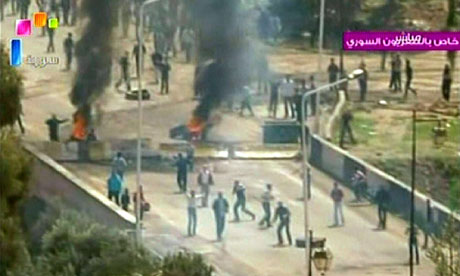Syria's biggest day of unrest yet sees at least 20 people killed
Protests move closer to the centre of Damascus as Bashar al-Assad's concessions fail to quell calls for reform

A screengrab of footage broadcast by Syrian state television, which allegedly shows clashes in Deraa. Photograph: AFP/Getty Images
Anti-government demonstrations have spread across Syria with the highest turnout yet in a month of unrest, despite a heavy crackdown by security forces in Deraa in which at least 22 people were reported killed.
Residents in Deraa said troops opened fire on thousands of protesters, and ambulances were prevented from reaching the scene.
A man who helped carry the dead and wounded to hospital said he had seen security forces shooting live ammunition. "My clothes are soaked with blood," he told the Associated Press, asking to remain anonymous for fear of reprisals.
LFriday night the death toll around the country was rising, with activists reporting more and more citizens taking to the streets.
Demonstrators are calling for President Bashar al-Assad, whose family has ruled Syria for nearly 40 years, to step down. Assad has made a series of concessions to quell the violence, including sacking his cabinet and firing two governors, but protesters say he has not gone far enough.
The unrest moved closer to the centre of the capital, Damascus, on Friday, where force was used against demonstrators in the Kafer Souseh and Harasta areas. A witness told the Guardian by phone that 4,000 people had gathered in Harasta, which has not seen demonstrations on previous Fridays. They carried olive branches and chanted "freedom". "It was peaceful until security forces attacked and some shots were fired," said the man, who asked for anonymity. "I saw six people shot, three of them with two bullets each."
A witness in Kafer Souseh said protesters leaving al-Refai mosque after prayers were beaten by security forces using batons and stun guns. He said he saw several "badly beaten" bodies which looked "lifeless".
"There were protests everywhere and from what we have seen the numbers were larger than last week," said Razan Zeitouneh, a lawyer and human rights activist in Damascus who is monitoring the movement. Protests were also held in Douma – which was largely peaceful after a brutal crackdown last week – Homs, Hama, Jableh, Banias, Deir Ezzor, Qamischli and small villages and towns around Damascus and Douma. Phones and internet services were not working in Douma.
State media again disputed that security forces were responsible for the violence in Deraa, saying gunmen had fired on protesters and police. "This expresses clearly and openly that there are some people who wish evil on Syria," a TV anchor said.
Thousands gathered in the Kurdish towns of Qamischli, Amouda and Derbasiyyeh hours after Assad announced he would grant nationality to 200,000 stateless Kurds. Kurdish activists said the reforms were inadequate. "We are part of the Syrian people and we also want the regime to lift the state of emergency and demand the enactment of new laws allowing for political parties," said Massoud Akko, a Kurdish journalist and activist. "We need cultural and political rights, not just nationality."
Other moves that failed to stamp out protests included sacking the governor of Homs, where people again took to the streets.
Assad has reached out to niche groups, including conservative Muslims, by reversing a ban on niqab-clad teachers in schools and closing Syria's only casino.
But protesters complain that he has still not lifted a 48-year-old emergency law, released political prisoners or allowed political parties to form. Anger is also rising at the continued use of force which local human rights organisations say has killed at least 173 people. "I don't see how this ends," said Zeitouneh. "The authorities keep lying and giving promises that won't satisfy people while the bloodshed continues to anger more people and encourage them on to the streets."
Katherine Marsh is a pseudonym for a journalist working in Damascus
Middle East protest coverage on Twitter
Follow events live with our correspondents and a network of selected Twitter users
Auto update every minute On | Off






